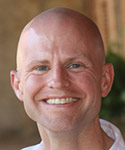On Christmas Eve four years ago, I was worshipping in a church in Texas. It was a beautiful service -- filled with the ancient, familiar words of the sacred Scriptures, hymns that lifted our spirits as well as our souls, and pageantry that meant robes for the clergy and bathrobes for the children in our living Nativity. The service ended shortly after midnight with the soft glow of 1,500 candles raised to the last verse of “Silent Night,” while outside the first Christmas Eve snow flurries reported in more than three decades swirled in the night sky. On an evening like that it is hard not to feel sentimental.
I made it to the last hymn before my tears came. These were not the tears of nostalgia, though; these were tears of recognition and of grief. I was crying because, for the first time in two years, I was sitting in a pew on Christmas Eve instead of standing in the pulpit. There was a part of me that wanted to be in the pulpit, behind the table, saying that -- whatever else might be true -- on this night, we remember that the Light of the World has come and that darkness shall never overwhelm Him.
I had not stood in a pulpit regularly in some six months, but it was on that night that I felt the full weight of what that meant. It was in that service that I learned about the emotional dimension of making a transition in ministry.
As early as sixth grade, I knew that I was supposed to be a preacher. My childhood dream became reality when I became the pastor of two congregations in rural, Western North Carolina. They were great churches with wonderful people.
And yet, after two years there, I felt I was being called elsewhere -- back to my alma mater, Duke Divinity School.
This was primarily because of what I had witnessed among my clergy colleagues during those two years. I had watched as colleagues burned out, left ministry for other work or “rusted out” -- preserving themselves by withholding their best energy and efforts from their work. I believed Duke was doing something to respond to these trends through its initiatives in continuing education and leadership development for clergy. By returning to Duke, I felt I could make a difference in the daily lives of parish pastors.
In June 2005, I moved back to Durham, N.C., leaving the pulpit for the sake of those who stand in the pulpit week after week. I thought I had prepared well for the transition. After all, I had cared for the details: I amassed a garage full of empty boxes, recruited volunteers to help me fill them, signed a contract with a moving company and wrote a farewell sermon. That was about it. So, when the move went without incident and my new work began, I assumed that I had transitioned well.
But that Christmas Eve service 1,000 miles from home offered a different witness. It showed me that, while I had cared for the technical elements of the move, I had not paid nearly enough attention to the emotional transition. It offered me the simple but powerful lesson that the hardest work of transitions is often the heart work. It is the emotional element that cannot be anticipated or predicted, explained or defined, charted on a timeline or mapped on a graph.
In my transition, I had shied away from my emotions in the face of my move. I didn’t want to feel the full weight of grief at leaving the parish, and I didn’t believe that I had time to experience the real joy of returning to my alma mater. In hindsight, I realize that was the wrong strategy -- rather than turn away from my feelings, I should turn toward them, to feel them and face them head on. I should have recruited a community of friends to reflect with me on my transition and how I was experiencing it, or at the very least, I should have resumed the practice of daily journaling.
Instead for six months, I worked hard and ignored my feelings. But things hidden will eventually be revealed. On Christmas Eve, as that service was drawing to a close, the full weight hit me. My life had changed. I was no longer a parish pastor; I was now entering the world of Christian institutional leaders. I was no longer the one in the pulpit but one of 1,500 in the pews; and that was okay. There was ministry to be done from that place, too.








